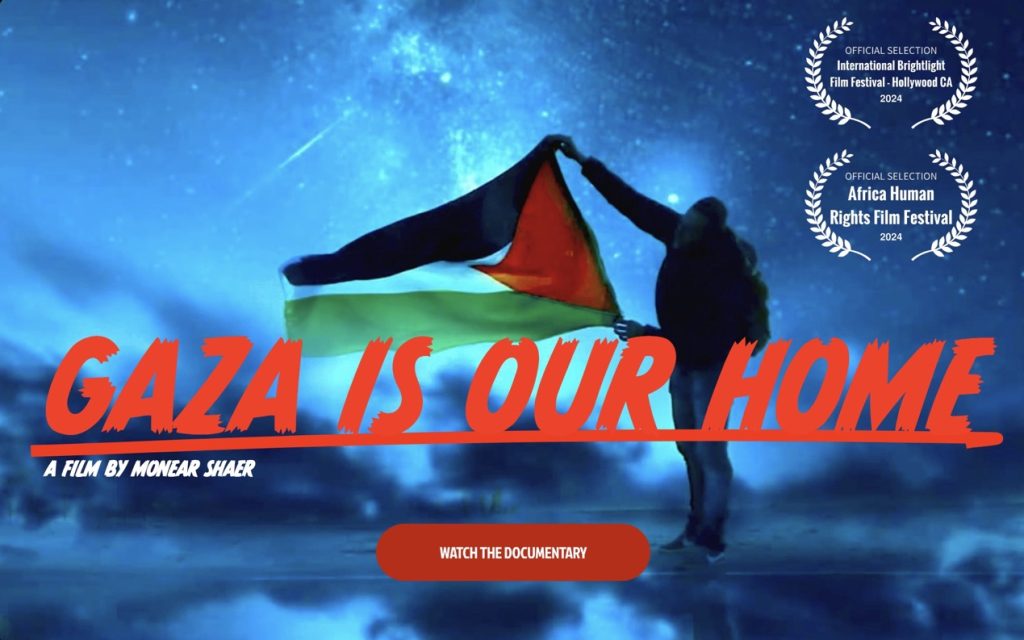The People’s Program: Making “Gaza is Our Home”
Inspired by Santa Barbara based journalist Caitlin Scialla’s article about Gaza is Our Home, The People’s Program welcomed the filmmaker, Monear Shaer, last week to discuss his film, storytelling process, and family story.
You can listen to the full episode, and read Scialla’s article below.
Heartbreak and Hope in Monear Shaer’s Gaza is Our Home
by Caitlin Scialla
This past spring, waves of protests unfolded across college campuses as students voiced their opposition to the relentless, U.S.-backed war that has been unleashed upon civilians in Gaza since October 7, 2024. Most notably, demonstrators pitched tents on university quads and demanded that their schools divest from companies that profit from the ongoing genocide in Palestine.
UCSB was similarly enveloped in surges of bold student activism. Autonomous activist groups organized an array of demonstrations, ranging from an occupation of Girvetz Hall (rechristened “Edward Said Hall”) to an encampment, dubbed the UCSB Liberated Zone, which stood for nearly two months on the lawn between Davidson Library and North Hall. In June, UCSB Students for Justice in Palestine, UCSB Jewish Voice for Peace, and UC Divest Coalition at UCSB rallied in favor of historic legislation that was ultimately passed by A.S. Senate. The legislation included a resolution that demands the UC’s divestment from corporations associated with the Israeli occupation and a bill that divests A.S. funds from complicit businesses.
In another memorable example of civil disobedience, UCSB Divest championed a day-long takeover of the Student Resource Building (SRB). On Thursday, April 26 student activists flooded the SRB, draping banners throughout the building, leading chants, and hosting teach-ins and workshops. Towards the end of the day, participants gathered for a screening of the recently-produced documentary Gaza is Our Home by Palestinian-American filmmaker, Monear Shaer.
As expressed on his website, and in the film itself, Shaer’s life was forever changed on October 7. The ensuing Israeli onslaught has resulted in the death of more than 40,000 Palestinians, with tens of thousands more injured and missing. Shaer personally has over 150 relatives trapped in Gaza and has been compelled to use his artistic abilities to broadcast the brutal reality of what his family, and the Palestinian people more generally, has suffered. In early December, Shaer received the devastating news that 33 family members had been killed after a U.S.-funded fighter plane dropped a bomb on his aunt’s house. Shaer has since dedicated himself fully to this project, working tirelessly to communicate the mounting crisis in Gaza.
“I’m sure if [the public] knew what I knew they would do something. Maybe they would care. They just haven’t been shown…”
These words, spoken by Shaer, open the film and introduce the dilemma that lies at the heart of his project. Although minimally featured on mainstream media, the horrifying situation in Palestine has been apparent for decades, at least to those who care enough to pay attention. During this beginning sequence, Shaer overlays his narration with countless screenshots, revealing how he and other pro-Palestine activists have used their social media platforms for years to share damning footage and statistics that expose the gravity of what is happening in Gaza.
And yet, public outcry has been eerily limited. Shaer ruminates on this paradox multiple times over the course of the documentary, reflecting deeply about how he can possibly heal this systemic indifference. The question is posed. . . How can Shaer, and pro-Palestine activists more generally, invoke widespread empathy? How can media be utilized to foster a culture of compassion that is pervasive enough to usher in meaningful political change? How can Shaer create a film that makes viewers on the other side of the world pay attention to Gaza?
The centerpiece of Gaza is Our Home is the personal footage that Shaer includes, specifically the photos and videos that he took during his last trip to Gaza back in 2021. The quality of these clips is far from professional, at times even grainy and shaky. Arguably, though, this adds rather than takes away from the viewing experience. These selfies, heartwarming videos of friends dancing at a wedding, and snapshots of stunning sunsets at the beach could be found on any of our iPhone camera rolls.
This collage of photos and videos humanize the harrowing statistics that chronicle the violence in Gaza, cutting through the propaganda that equates victims to terrorists in an attempt to justify the baseless barrage of airstrikes. We can put faces and stories to the numbers, which is powerful. But, even more than that, this technique places the audience in Palestinian shoes, even if only for a moment. It is impossible not to ask yourself: What if this was me, what if these were my loved ones, what if my home was eradicated, what if my life was upended? Intense feelings of grief, aguish even, are inevitable whilst watching Gaza is Our Home. The nitty gritties of the politics, which have historically impeded Americans from taking a strong stance and pledging solidarity with Palestine, melt away.
This emotional knee jerk is at the core of the film. However, woven throughout, is commentary from Shaer himself and his family members that underscores some larger questions. Particularly, why has this horrific loss of life in Gaza been shrugged off by mainstream media? Why has this conflict been distorted into something complex and controversial when it is, quite frankly, not.
Gaza is Our Home highlights this issue of media censorship and, at the same time, counteracts it by amplifying the stories and voices that have been silenced. Despite the heartbreak and tragedy that characterizes the film, Shaer is sure to showcase the beauty and resilience of Gaza and its people. A strong sense of hope that Gaza will be rebuilt and that those entrapped within will be liberated echoes throughout the documentary. And those of us watching are reminded that we have a voice, we have the privilege to speak up, we have the power to fight for a free Palestine.
Gaza is Our Home has been solely produced by Monear Shaer. He has not been supported by a studio and, now that the film has been completed, Shaer needs our support in getting this documentary out into the public. I would urge everyone to visit his website, watch the documentary, and pass it along to others.

